Note
Go to the end to download the full example code.
spin-polarized fatbands
This example shows how to plot the L-projected fatbands of Ni using the results stored in the FATBANDS.nc files produced with prtdos 3.
Open the file (alternatively one can use the shell and abiopen.py FILE -nb to open the file in a jupyter notebook This file has been produced on a k-path so it’s not suitable for DOS calculations.
import abipy.abilab as abilab
import abipy.data as abidata
fbnc_kpath = abilab.abiopen(abidata.ref_file("ni_kpath_FATBANDS.nc"))
NC files have contributions up to L = 4 (g channel) but here we are intererested in s,p,d terms only so we use the optional argument lmax
lmax = 2
# Energy limits in eV for plots. The pseudo contains semi-core states but
# we are not interested in this energy region. Fermi level set to zero.
elims = [-10, 2]
# Print file info (dimensions, variables ...)
# Note that prtdos = 3, so LM decomposition is not available.
print(fbnc_kpath)
# Plot the k-points belonging to the path.
#fbnc_kpath.ebands.kpoints.plot()
================================= File Info =================================
Name: ni_kpath_FATBANDS.nc
Directory: /home/runner/work/abipy/abipy/abipy/data/refs/ni_ebands
Size: 619.35 kB
Access Time: Fri Dec 26 09:03:34 2025
Modification Time: Fri Dec 26 08:58:19 2025
Change Time: Fri Dec 26 08:58:19 2025
================================= Structure =================================
Full Formula (Ni1)
Reduced Formula: Ni
abc : 2.489016 2.489016 2.489016
angles: 60.000000 60.000000 60.000000
pbc : True True True
Sites (1)
# SP a b c
--- ---- --- --- ---
0 Ni 0 0 0
Abinit Spacegroup: spgid: 225, num_spatial_symmetries: 48, has_timerev: True, symmorphic: False
============================== Electronic Bands ==============================
================================= Structure =================================
Full Formula (Ni1)
Reduced Formula: Ni
abc : 2.489016 2.489016 2.489016
angles: 60.000000 60.000000 60.000000
pbc : True True True
Sites (1)
# SP a b c
--- ---- --- --- ---
0 Ni 0 0 0
Abinit Spacegroup: spgid: 225, num_spatial_symmetries: 48, has_timerev: True, symmorphic: False
Number of electrons: 18.0, Fermi level: 11.296 (eV)
nsppol: 2, nkpt: 101, mband: 12, nspinor: 1, nspden: 2
smearing scheme: gaussian (occopt 7), tsmear_eV: 0.204, tsmear Kelvin: 2368.3
=============================== Fatbands Info ===============================
prtdos: 3, prtdosm: 1, mbesslang: 5, pawprtdos: 0, usepaw: 0
nsppol: 2, nkpt: 101, mband: 12
Idx Symbol Reduced_Coords Lmax Ratsph [Bohr] Has_Atom
----- -------- ----------------------- ------ --------------- ----------
0 Ni 0.00000 0.00000 0.00000 4 2 Yes
Plot the electronic fatbands grouped by atomic type.
fbnc_kpath.plot_fatbands_typeview(ylims=elims, lmax=lmax, tight_layout=True)
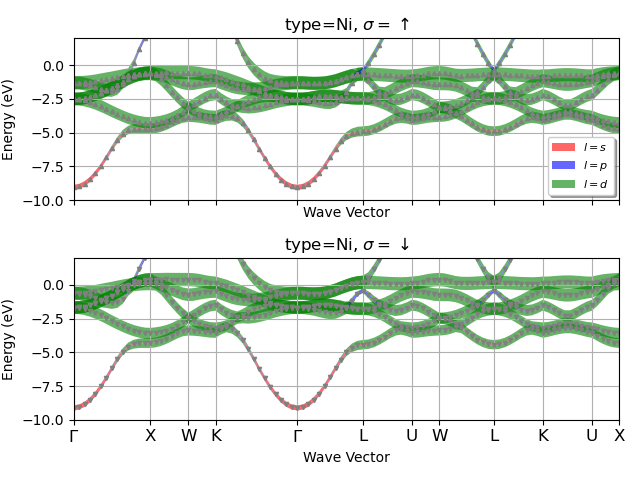
For the plotly version use:
Plot the electronic fatbands grouped by L.
fbnc_kpath.plot_fatbands_lview(ylims=elims, lmax=lmax, tight_layout=True)
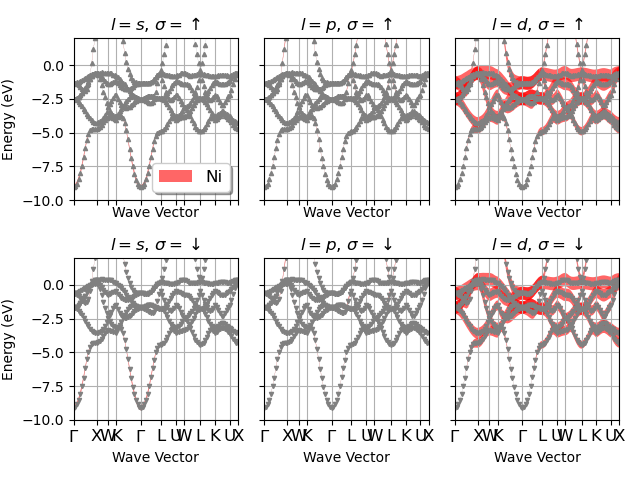
For the plotly version use:
Now we read another FATBANDS file produced on 18x18x18 k-mesh
fbnc_kmesh = abilab.abiopen(abidata.ref_file("ni_666k_FATBANDS.nc"))
Plot the L-PJDOS grouped by atomic type.
fbnc_kmesh.plot_pjdos_typeview(xlims=elims, lmax=lmax, tight_layout=True)
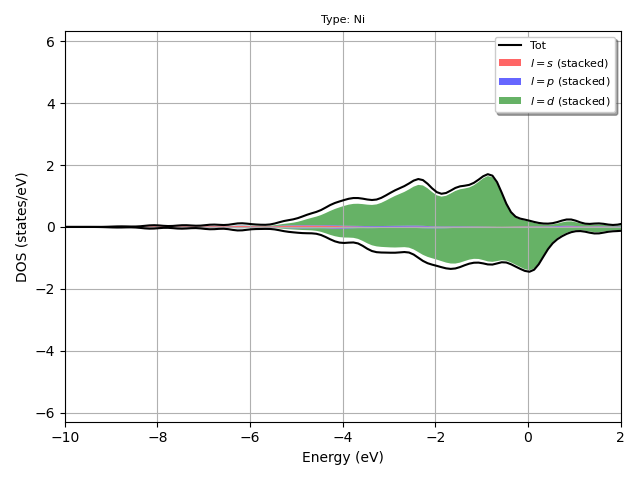
For the plotly version use:
Plot the L-PJDOS grouped by L.
fbnc_kmesh.plot_pjdos_lview(xlims=elims, lmax=lmax, tight_layout=True)
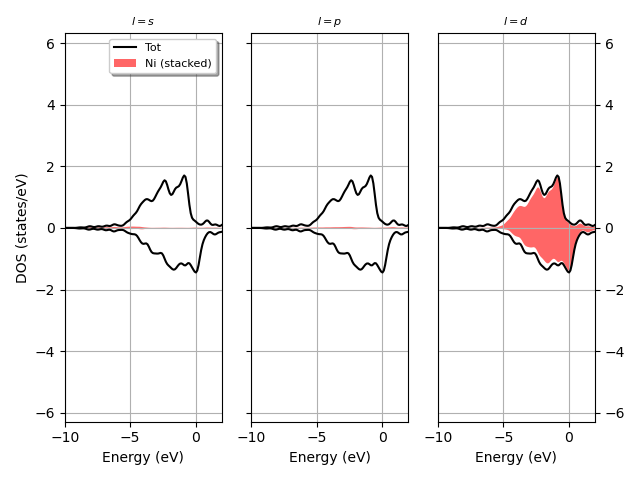
For the plotly version use:
fbnc_kmesh.plotly_pjdos_lview(xlims=elims, lmax=lmax)
Now we use the two netcdf files to produce plots with fatbands + PJDOSEs. The data for the DOS is taken from pjdosfile.
fbnc_kpath.plot_fatbands_with_pjdos(pjdosfile=fbnc_kmesh,
ylims=elims, lmax=lmax, view="type", tight_layout=True)
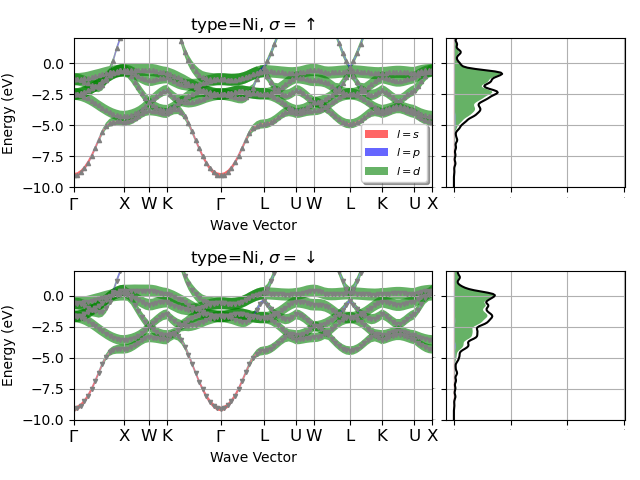
For the plotly version use:
fbnc_kpath.plotly_fatbands_with_pjdos(pjdosfile=fbnc_kmesh,
ylims=elims, lmax=lmax, view="type")
fatbands + PJDOS grouped by L
fbnc_kpath.plot_fatbands_with_pjdos(pjdosfile=fbnc_kmesh,
ylims=elims, lmax=lmax, view="lview", tight_layout=True)
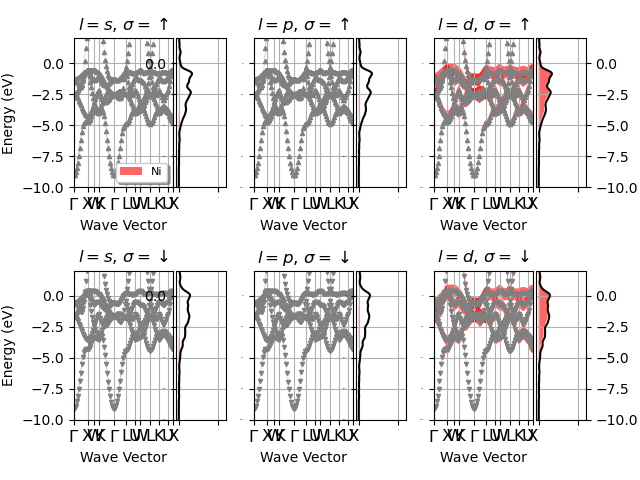
For the plotly version use:
fbnc_kpath.plotly_fatbands_with_pjdos(pjdosfile=fbnc_kmesh,
ylims=elims, lmax=lmax, view="lview")
Close files.
Total running time of the script: (0 minutes 4.594 seconds)